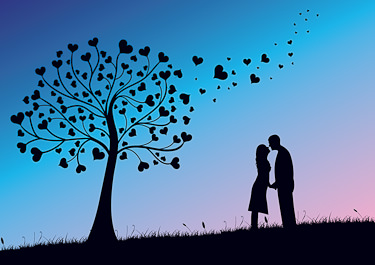
Of course, even in monogamy, no one person can completely fulfill another’s needs. Perhaps, if you are very lucky, they can do so sexually, but almost all of us need intimacy and closeness with other people. Be it friends, or family, or colleagues, we need to be able to call on a few people for conversation and friendship (even if it is only for something as simple as being able to discuss music our partner isn’t particularly interested in). There is richness in that kind of multiplicity. In fact, when I look at monogamous relationships that seem particularly co-dependent to the extent that they become exclusive – people who struggle to find time for other things because they are with their partners so much, or who spend all their free time waiting for their partners – it frightens me. The idea that you can find everything you need in one person has been so romanticised, yet in reality, it’s a scary prospect. But still we cling to this idea of love being one thing, and coming from one person; and the pictures that surround this ideal saturate our culture and our society.
I have, once or twice, asked someone to choose between me and someone else. It never turned out in my favour really, and even if it did I was left with the sting of resentment that I had even asked in the first place. In those situations the idea of non-monogamy didn’t even occur to me – we were all naïve once, weren’t we? – but even if it had, I have a feeling it wouldn’t have appealed much to my partners. Not that making judgements retrospectively does anyone much good.
But here’s the thing: on the other side of it, being asked to choose, or being put in a situation where I felt I should choose, the choice always struck me as being somewhat ridiculous. Because I’ve never loved one person in the same way that I’ve loved another. In fact, every time I have been in love, or even felt deep affection, it has been unique to each particular person. I have loved with intense sexual urgency; I have loved with the deepest appreciation; I have loved in adolescence, somewhat playfully but still ardently; I have loved purely because of the way a man understands what it means when I’m short with him; and I have loved because he knew how to put me in my place. In the end, that choice is not like choosing between two brands of tobacco; it’s like choosing between a painting and the rain. The choice makes no logical sense.
There is a scene in Mansfield Park – and here’s where I ashamedly confess, as an English student, that I haven’t read it; I’ve only seen Patricia Rozema’s rather superb film version – where Mary Crawford asks Edmund if he loves Fanny, and in response he says “Of course I love her, but there are as many forms of love as there are moments in time.”
Even when I was monogamous, and still focused on that idea of finding my one, I felt very strongly that this statement was true. Every time I fall in love it feels unique and special, as though no one in the history of the world has felt exactly the way I feel. Not only do I think that is true, I also think our love for one person changes dramatically as we love them. The same way people change and time moves.
But I am becoming far too sentimental here! What this knowledge, or revelation really means is that whilst, as a non-monogamous person, I have to get over the idea of love as something singular, it also means I don’t have to let go of the idea of being loved uniquely. And, in fact, there is something extraordinarily beautiful in the idea of loving someone in a way that I have never loved before, and then being able to reach out elsewhere and say, simultaneously, the same about someone else. Surely the uniqueness of that love can only be enhanced by the fact that I don’t have to choose one.
And all this without even mentioning our capacity to love more than one child, and more than one friend. Love is most definitely not finite.

